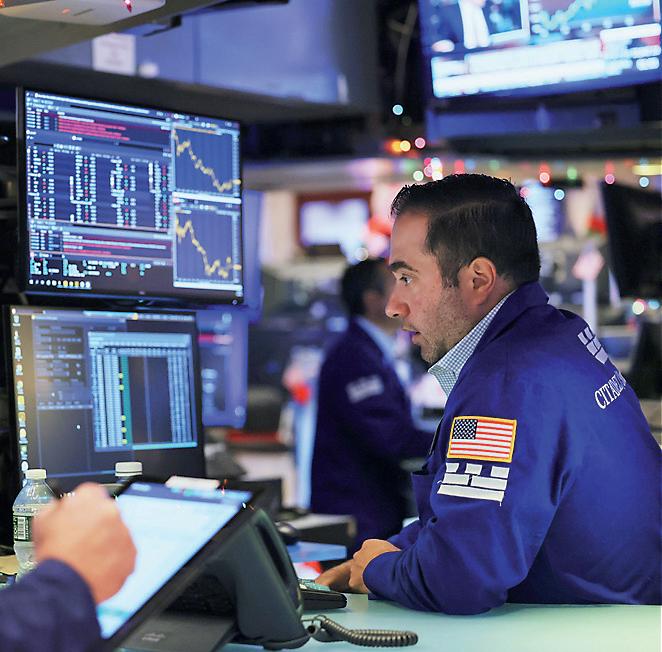
3 minute read
Stock Market
FAN YU is an expert in finance and economics and has contributed analyses on China’s economy since 2015. Fan Yu
How to Invest in 2023
The tide is turning against index funds
The market’s fixation on inflation and the Fed’s interest rate moves appears, at least for now, over. We’re moving onto real concerns such as an economic recession, and for investors, a corporate earnings and growth decline as a result of said recession.
Investors should be prepared to use a few tools depending on how the year unfolds.
Be Defensive
This is partially math. Let’s say you have two portfolios, one fairly defensive and one aggressively growth-oriented, with $100 in each account to start. The defensive portfolio makes a modest 7 percent total return in 12 months (e.g. 5 percent appreciation and 2 percent dividend yield), ending at $107. The aggressive portfolio loses 10 percent in the first six months. It would need to gain an additional 19 percent the rest of the way to achieve parity at the end of the year with the defensive portfolio (to end at $107).
Put differently, in the long term, it’s usually better to pass up higher returns than to suffer losses.
What are defensive stocks? It generally refers to industries that are less economically sensitive such as consumer staples (food and drinks, household products, grocery stores), health care (people need medicine and treatments regardless of the economy), defense and infrastructure (usually funded by government budgets), and utilities (your local electricity distributor).
Don’t Depend on Index Funds
The past decade-plus has given rise to so-called index funds that track the market, or a particular index. This has been popularized by funds and ETFs (exchange-traded funds) managed by Vanguard, State Street / SPDR ETFs, BlackRock / iShares, among others. Its idea was that a rising tide lifts all boats and investors were content with riding along with the market.
Well, the tide is receding and performance differentiation is now critical. Investors should consider funds managed by active managers who have a positive track record, experience investing in downturns, and longevity. Index funds are cheaper and more preferable in rising markets, but in choppy markets with violent price swings, 50 basis points of “lower expenses” isn’t going to make a difference.
Prioritize Income
After an atypical year where bonds and equities both fell, many experts predict bonds will show a good return in 2023.
“With the bulk of rate hikes behind us and the Fed’s ‘slower but longer’ approach taking shape, we think it makes sense to modestly increase duration through bolstering core bond allocations, especially in investment grade credit,” Nuveen Asset Management wrote in its 2023 preview for clients. The firm has the highest conviction in high-quality corporate bonds.
The risk/reward tradeoff for bonds has significantly improved, and the current market environment represents a very compelling entry point.
Keep an Eye on the Future
Despite the overall defensive positioning, it’s still wise to place a few secular, thematic bets.
One theme is deglobalization and onshoring. This is caused by rising labor costs in emerging markets but also due to geopolitics as China and Russia continue to isolate themselves. Setting up new production capabilities requires a significant source of raw materials, commodities, and energy. Think of miners such as BHP Group, chemical companies such as Dow, and energy firms such as ExxonMobil.
Another shift is the world’s aging demographics. Boomers are retiring or retired, and there’s a significant demand for medical services, affordable drugs, etc. Investors can look at real estate investment trusts (REITs) that own senior housing, dialysis and care centers, and medical offices. The health care industry, aside from being defensive in nature, also benefits from an aging population.
War preparation and defense is another secular trend. Defense and aerospace firms such as Lockheed Martin, Raytheon, and Northrop Grumman are some of those that could benefit.
These are long-term trends not just for 2023. But as the country tips into a recession, market valuations next year can offer a good entry point for a long-term investment.









